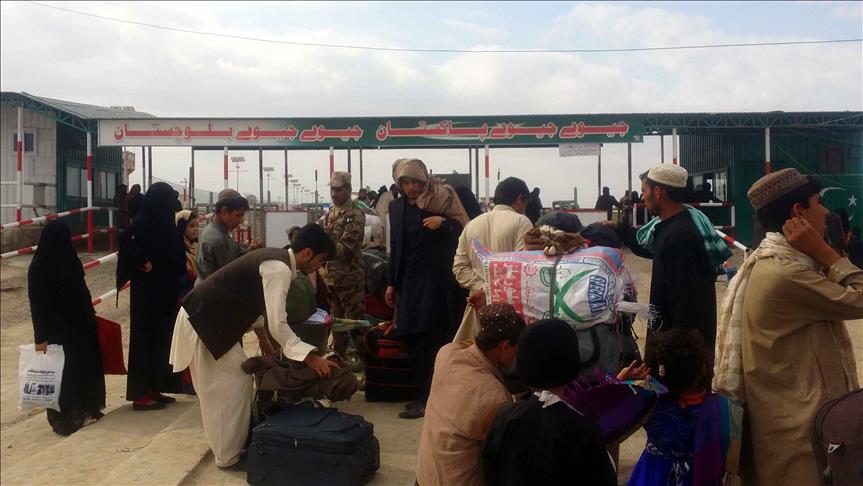ID :
438794
Tue, 03/07/2017 - 18:53
Auther :
Shortlink :
https://www.oananews.org/index.php//node/438794
The shortlink copeid
Pakistan temporarily reopens Afghan crossings

KABUL, Afghanistan/KARACHI, Pakistan
Thousands of people from both sides of the Pak-Afghan border flocked towards crossing points between the two countries on Tuesday, 18 days after they were shut down by Pakistani authorities following a spate of terror attacks.
The most frequented crossing points -- Torkham in the northeast and Chaman in the southeast of the country -- saw long queues of men, women and children enter Afghanistan after Pakistan said it would “temporarily open” its side of the border for two days.
Many ill people were among those who were crossing over, including 57-year-old Abdul Hai who said he went for a short visit to Pakistan on Feb. 15 to seek medical treatment; however, he was left stranded there when the border was sealed on Feb. 17.
“I had a valid visa on my passport, but my grandson who was accompanying me did not have it; I went through a painful experience during the long and tiring stay there, and I am now coming back with this child [his grandson] who does not have any travel documents,” Abdul Hai told Anadolu Agency.
Islamabad announced on Monday the two main crossings would remain open for Tuesday and Wednesday to provide an opportunity to such hundreds of civilians stranded on both sides of the border.
On Feb. 17, Pakistan unilaterally closed its border with Afghanistan, commonly known as the Durand Line, “due to security reasons” following a spate of terror attacks, including a suicide bombing at a Sufi shrine in southern Sehwan that left 90 people dead.
Pakistani officials including the military high-ups blamed the attacks on “Afghanistan-based terrorists”.
Pakistan and Afghanistan share 18 crossing points -- the most commonly used ones are Torkham and Chaman.
Afghanistan does not recognize the Durand Line -- a 2,640-kilometer (1,640-mile) long border, which was established in 1893 in line with an agreement between India under British colonial rule, and Abdur Rahman Khan, the then ruler of Afghanistan.
The requirement of valid visas has been made compulsory only since January this year.
Civilians hit hardest
Najibullah Sahibzada, a civil society activist in eastern Afghanistan, said: “Only the poor, vulnerable and needy people suffer such closures.” He urged authorities to reconsider the decision to only temporarily reopen the border and instead called for permanent opening of borders between the neighbors.
“Those with deep pockets can take the aerial route while those planning terrorists attacks in both countries never use these crossing points [Chaman and Torkham] in the first place; only those people living in rural mountainous areas who need to visit [Pakistani cities of] Peshawar or Quetta for medical treatment, or to meet their relatives, and cannot afford airfares use these crossing points,” Sahibzada said.
Another Afghan, Amjad Khan, said he went to Pakistan only to ink deals with local pharmaceuticals companies for supplies, but instead he got stranded for more than two weeks.
“It hurts our business immensely. We have been importing medicine from Pakistan for years, it is much better and affordable than the Iranian and Indian medicine, but such political and militarily-charged decisions [to shut borders] are only going to hurt people and cause more hatred than harmony among the neighbors,” he said.
Islamabad's justification rejected
Qazi Anwer, a Peshawar-based lawyer and civil society activist, told Anadolu Agency: “This is a totally incomprehensible and unjustified to close down border with a landlocked country like Afghanistan, which heavily depends on you [Pakistan] to cope with even its food requirements,”
“The continuous closure of the border is affecting thousands of Pakistanis and Afghans who have relatives on both sides of the border. Similarly, hundreds of traders and businessmen from both sides are conceding huge losses because of the border closure,” Anwer, a former senator, said.
He dismissed Islamabad’s justification the border crossings had been closed to stop terrorists from infiltrating into Pakistan. He said the terrorists do not use heavily-fortified crossings like Torkham or Chaman.
Abdul Qayyum, a Peshawar-based importer who supplies flour and cement to Afghanistan, agreed. “They [terrorists] are using unconventional routes to trickle into Pakistan. Closure of Chaman and Torkham crossings will not at all affect their infiltration. These crossings are meant for trade and commerce,” Qayyujm told Anadolu Agency.
“We must understand this fact, and reopen the border immediately as it is in the common interest of both countries,” he said.
“It is ironic our border with India [which the Pakistani military considers as its biggest enemy] is open despite frequent border clashes for last several months. But we have closed our borders for a brotherly Muslim country, which hugely depends on us,” he went on to say.





